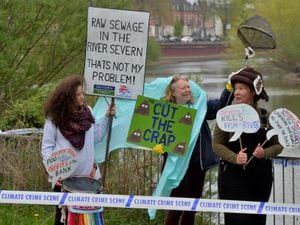Investigation reveals 'illegal sewage dumping into rivers' through more than 800 pipes
An investigation has found hundreds of discharge pipes across the UK, including in Shropshire and Mid Wales, are potentially illegally dumping raw sewage into the country's waterways.

There are more than 870 pipes which could be operating without permits, of which upwards of 200 are confirmed by water companies to be in use, according to findings from Channel 4's Dispatches programme – the figures included pipes operated by Severn Trent Water, and Welsh Water.
Except in very limited circumstances, permits are required for firms to spill untreated sewage into rivers and seas during periods of high rainfall, to prevent sewers becoming overloaded and backing up into homes.
The issue has been an increasing concern, with campaigners pressing for greater action to prevent raw sewage being dumped in the country's waterways.
Using Environmental Information Regulation requests, Dispatches found that Welsh Water has 184 sewage discharge pipes without permits, all of which are said to be in use.
Severn Trent is said to have 420, although the company has not said how many are in operation.
The firm claimed Dispatches' interpretation of the data was "not accurate", and said that permits can be "at varying stages of an administration process".
Responding to the figures Welsh Water has said it would be "fundamentally incorrect and simply untrue" to say it was "deliberately operating these assets illegally".
The firm said the unpermitted Combined Storm Overflows (CSOs) were pinpointed following a detailed review which identified previously unknown assets from before the water industry was privatised.
It is working to secure the appropriate permits "as quickly as possible" and noted: "If these CSOs were prevented from operating during the permitting process, it would result in homes, schools and businesses flooding during heavy rain."
The investigation also found Northumbrian Water has 61 pipes without permits, all of which are reportedly being used.
The company said the outfalls operate, and their performance is reported to the Environment Agency, in "exactly the same way as any other".
Meanwhile, a whistleblower told the investigation that water companies are being left to investigate their own incidents as Environment Agency funds have been slashed.
Helen Nightingale, who has recently retired from the agency after 30 years, said: "The funding's been cut massively... so we have fewer officers to go out and do the work.
"We are only supposed to attend the very serious or quite serious incidents. The lower impact incidents... environment officers are told not to attend them.
"We aren't as aggressive. We don't enforce to the same extent against water companies. Now water companies investigate their own incidents and tell us what category it is."
It follows claims from Labour earlier this week that Liz Truss presided over "efficiency savings" during her time as environment secretary that significantly slashed funding for the Environment Agency and resulted in "doubled sewage discharge".
The party's analysis of official figures showed that between 2016 – when the Tory leadership frontrunner was in charge of Defra – and 2021, raw sewage discharge more than doubled, from 14.7 per overflow to 29.3.
This coincided with Ms Truss cutting £80 million of sewage monitors as part of a £235 million Tory axe to the Environment Agency's budget.
As environment secretary, Ms Truss justified the cuts saying "there are ways we can make savings as a department" citing better use of technology and inter-agency working.
George Eustice, who now has the environment brief, defended a new plan from the Government to crack down on damaging sewage spills after critics called the proposals a "cruel joke".
He said he was the first secretary of state to "really grip" the issue, following an announcement that water companies will be expected to invest £56 billion over 25 years to combat the impact of storm overflows on England's seas and rivers.
But the proposals drew criticism from conservation campaigners, who claimed the plan aimed merely to "claw its way back to what should have already been 'business as usual'".
Jim McMahon, Labour's shadow secretary of state for environment, food and rural affairs, said the Tories have allowed the country to be treated "as an open sewer".
Dispatches said it was told by Severn Trent, Northumbrian Water and Welsh Water that the companies are working proactively with the Environment Agency to ensure the correct permits are in place for all storm overflows.
The Environment Agency told the programme: "Water companies have rightly been condemned for allowing far too many sewage spills and we are holding the industry to account on an unprecedented scale."
The Department for Environment, Food and Rural Affairs told PA: "We are the first government to take action to tackle sewage overflows. We have been clear that water companies' reliance on overflows is unacceptable and they must significantly reduce how much sewage they discharge as a priority.
"This is on top of ambitious action we have already taken, including setting targets to improve water quality which will act as a powerful tool to deliver cleaner water, pushing all water companies to go further and faster to fix overflows."





